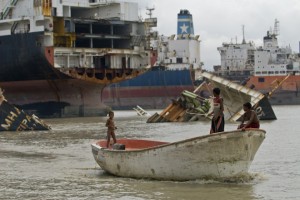 A record-breaking number of 365 toxics-laden ships were sent for breaking by European shipowners to the beaches of South Asia in 2012, according to a list released today by the NGO Shipbreaking Platform, a global coalition of environmental, human rights and labour rights organisations working for safe and sustainable ship recycling. This number represents a 75% increase from 2011, when 210 EU-owned ships were sent for breaking in India, Bangladesh and Pakistan[1].
A record-breaking number of 365 toxics-laden ships were sent for breaking by European shipowners to the beaches of South Asia in 2012, according to a list released today by the NGO Shipbreaking Platform, a global coalition of environmental, human rights and labour rights organisations working for safe and sustainable ship recycling. This number represents a 75% increase from 2011, when 210 EU-owned ships were sent for breaking in India, Bangladesh and Pakistan[1].
“Despite the possibility of proper disposal in Europe or other developed countries, the vast majority of European shipping companies continue to profit by having their ships broken cheaply and dangerously on the beaches of South Asia. The EU must adopt mechanisms that will prevent European shipowners from exporting toxic ships for breaking in developing countries and instead recycle them according to the health, safety and environmental laws and standards of their own countries,” says Patrizia Heidegger, Executive Director of the NGO Shipbreaking Platform.
Of the top 10 European “global dumpers” in 2012, Greek shipowners were number one, dumping 167 ships on South Asian beaches, or nearly half of all ships sent by European shipowners in 2012. German shipowners represented the second largest group of toxic ship dumpers (48 ships) followed by shipowners from the UK (30 ships), Norway (23 ships), Cyprus (13 ships), Bulgaria (8 ships), Denmark (6 ships) and the Netherlands (5 ships). Shipowners from all countries, except the Netherlands and Norway[2], increased the number of end-of-life ships exported to Asia, with Italian shipowners sending three times as many ships in 2012 compared to the year before and MSC, the main Swiss containership and cruise ships company[2], beaching 23 ships in 2012, compared to only 5 in 2011. The rest was sent by shipowners based in Estonia (3 ships), Sweden (3 ships), Lithuania (2 ships), Belgium (2 ships), Romania (2 ships), Latvia (1 ship) and Poland (1 ship).
The Platform’s 2012 list shows that most of the end-of-life ships sent by European shipowners did not fly an EU flag[3]. In fact, 240 of them used what is commonly referred to as the “flags of convenience” phenomenon, using flags such as Panama, Liberia, the Bahamas or St Kitts-and-Nevis, which makes it more difficult for the EU to prevent their dismantling in substandard facilities. The NGO Shipbreaking Platform is currently working with the European Parliament to introduce a financial mechanism that would help shipowners internalize the costs of proper disposal of the hazardous materials found in end-of-life vessels. The Platform wants the mechanism to apply to all ships calling at European ports, instead of only addressing EU-flagged vessels. The financial mechanism could be a fund financed by fees paid by shipowners; an insurance; or a savings account guaranteeing that funds are put aside for safe and environmentally sound ship recycling. The EU Commission failed to introduce such a financial mechanism in its proposal for a European Regulation on ship recycling published in March 2012. Under the Cypriot Presidency, which ended in December, the EU Council failed to strengthen the Commission proposal. Coincidentally, in 2012, Cypriot shipowners sent 13 ships to the South Asian beaches. Also Greece and Germany, the two biggest European ships dumpers, do not show the political will to stop the export of end-of-life vessels.
China is another major destination of concern for end-of-life ships sold by EU-based shipowners. Both China and the EU have ratified the Basel Ban Amendment that prohibits any transboundary movement of hazardous waste exported from OECD to non-OECD countries. While today’s list focuses on end-of-life ships sent to beaches in South Asia, and even though the Shipbreaking Platform welcomes the fact that China has outlawed beaching and uses a higher level of mechanization, it notes with continued concern, the absence of independent trade unions in China, the lack of proper downstream management of toxic residues such as PCBs as well as the fact that such exports are likely to violate the Basel Ban Amendment.



![Aerei Saab [foto: imagoeconomica]](https://staging.eunews.it/wp-content/uploads/2024/11/Imagoeconomica_2292144-350x250.jpg)




